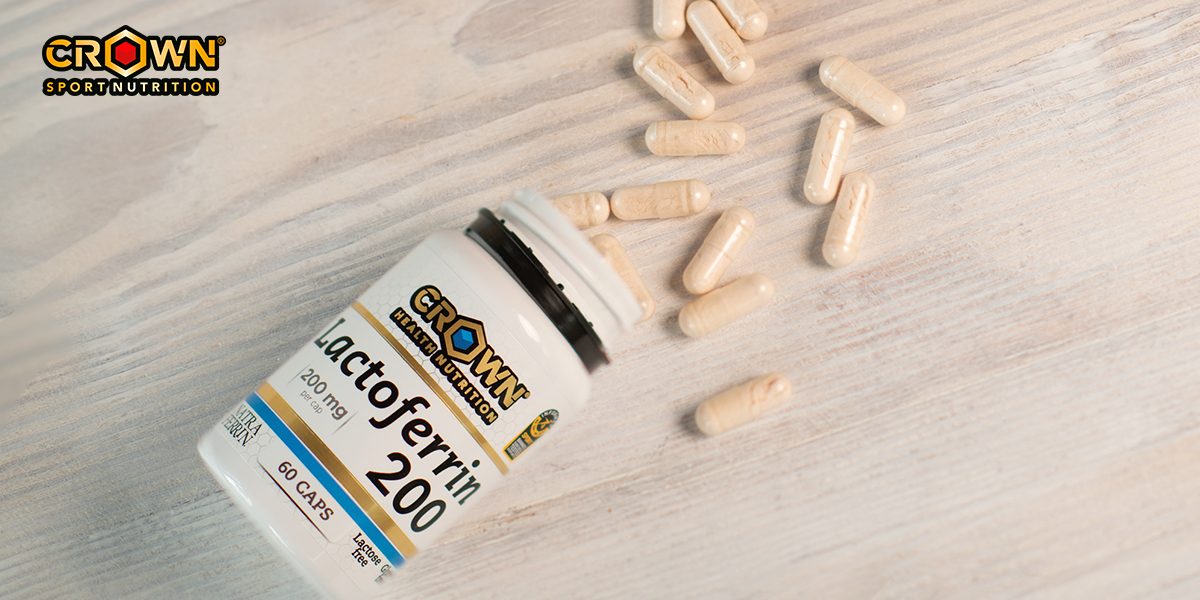La suplementación deportiva en los atletas puede tener distintos objetivos como la mejora del rendimiento, el mantenimiento de un estado de salud adecuado, o incluso la prevención de posibles consecuencias negativas o deficiencias nutricionales. En este sentido, la búsqueda de suplementos que puedan ayudar a cualquiera de las funciones anteriores es de gran interés práctico. En este contexto surge la lactoferrina.
¿Qué es la lactoferrina?
La lactoferrina es una proteína que pertenece a la familia de las glicoproteínas (una proteína unida a carbohidratos). Esta proteína se encuentra de forma natural en distintas zonas del cuerpo humano (p.ej., leche materna), y puede ser obtenida a partir de la leche de vaca para su suplementación.
La lactoferrina tiene la capacidad de unirse fuertemente al hierro, secuestrando este hierro y evitando que distintas bacterias o microorgnaismos lo utilicen para crecer [1]. Además, regula los niveles de hierro en el organismo ayudando a absorberlo de forma eficiente a nivel intestinal.
Por ello, tiene funciones específicas como por ejemplo antimicrobiana, regulación del sistema inmune, antioxidante, antiinflamatoria o reguladora de los niveles de hierro [1].
Beneficios de la suplementación con lactoferrina en atletas
Los atletas generalmente están sometidos a periodos de entrenamiento o competición de muy alta intensidad y elevado volumen. Estos periodos, pueden debilitar el sistema inmunitario aumentando el riesgo de desarrollar infecciones como por ejemplo infecciones respiratorias (resfriado común) [2–4]. En este sentido, se ha demostrado que la suplementación con lactoferrina puede ayudar al mantenimiento del funcionamiento normal del sistema respiratorio [5,6], y reducir la incidencia de infecciones del tracto respiratorio [6]. Además, la suplementación con lactoferrina ayuda al mantenimiento normal del sistema inmunitario disminuyendo los niveles de moléculas pro-inflamatorias en el organismo [6]. Por tanto, podríamos extrapolar que su uso podría ser de interés en situaciones de elevado volumen y alta intensidad para el adecuado funcionamiento del sistema inmune bajo situaciones de elevado estrés.
Tal y como hemos mencionado anteriormente, la lactoferrina tiene una función reguladora del hierro. En este sentido, aunque existen pocos estudios realizados en atletas, en otras poblaciones clínicas con riesgo de anemia (p.ej., embarazadas), se ha demostrado que la suplementación con lactoferrina puede mejorar los niveles de hemoglobina y hierro en sangre con mejor tolerancia y menos efectos secundarios que otros suplementos de hierro [7,8]. En este contexto, debemos entender que los atletas, especialmente mujeres, tienen un mayor riesgo de deficiencia de hierro y de anemia por esta deficiencia de hierro [9].
De forma similar, también en mujeres atletas no embarazadas —específicamente en corredoras de larga distancia— la lactoferrina ha demostrado ser eficaz para reducir la frecuente anemia que afecta a este grupo. En un estudio clínico, estas deportistas recibieron durante 8 semanas hierro, con o sin lactoferrina [10]. Los resultados mostraron que el grupo suplementado con lactoferrina presentó un mayor número de glóbulos rojos, así como niveles significativamente más altos de ferritina sérica e hierro en sangre. Además, se incluyó una prueba de rendimiento con una carrera de 3000 metros antes y después de la intervención. Tras el periodo de suplementación, las atletas que tomaron lactoferrina mostraron una menor acumulación de lactato, lo que sugiere un aclaramiento más eficiente de este metabolito y una mejor adaptación al esfuerzo, probablemente gracias a un transporte de oxígeno más eficaz y una mayor eficiencia metabólica. En conjunto, estos hallazgos indican que la deficiencia de hierro y la consiguiente disminución del rendimiento deportivo, especialmente común en mujeres, podría abordarse con lactoferrina.
¿Cómo suplementarnos con lactoferrina?
De forma general la dosis de suplementación es de 200mg al día para situaciones de prevención de las posibles consecuencias anteriormente mencionadas. Respecto al momento del día para su suplementación, se recomienda ingerirla justo antes de las comidas con el estómago vacío para potenciar su absorción.
Conclusión
En conclusión, la lactoferrina surge como un posible suplemento para regular la función inmunitaria, el equilibrio del hierro y, por tanto, el rendimiento deportivo en atletas. Este suplemento no solo puede ser útil como tratamiento ante posibles situaciones negativas, sino también como medida preventiva a largo plazo para preservar la salud y el rendimiento.
10% DESCUENTO EN LA WEB CON EL CÓDIGO:
CROWN10
*Envío gratis en pedidos superiores a 25€
Lactoferrin 200
AUTOR
Lucas Jurado Fasoli – Doctor en Biomedicina (UGR). Dietista-Nutricionista. Investigador en el Instituto Mixto Universitario Deporte y Salud y Profesor Ayudante Doctor en el Departamento de Fisiología, Universidad de Granada.
referencias
[1] Hong R, Xie A, Jiang C, Guo Y, Zhang Y, Chen J, et al. A review of the biological activities of lactoferrin: Mechanisms and potential applications. Food Funct 2024.
[2] Engebretsen L, Soligard T, Steffen K, Alonso JM, Aubry M, Budgett R, et al. Sports injuries and illnesses during the London Summer Olympic Games 2012. Br J Sports Med 2013;47:407–14.
[3] Pedersen BK, Steensberg A, Schjerling P. Exercise and interleukin-6. Curr Opin Hematol 2001;8:137–41.
[4] Pedersen BK, Toft AD. Effects of exercise on lymphocytes and cytokines. Br J Sports Med 2000;34:246–51.
[5] Oda H, Kubo S, Tada A, Yago T, Sugita C, Yoshida H, et al. Effects of bovine lactoferrin on the maintenance of respiratory and systemic physical conditions in healthy adults—a randomized, double-blind, placebo-controlled trial. Nutrients 2023;15:3959.
[6] Berthon BS, Williams LM, Williams EJ, Wood LG. Effect of lactoferrin supplementation on inflammation, immune function, and prevention of respiratory tract infections in humans: a systematic review and meta-analysis. Advances in Nutrition 2022;13:1799–819.
[7] Nappi C, Tommaselli GA, Morra I, Massaro M, Formisano C, Di Carlo C. Efficacy and tolerability of oral bovine lactoferrin compared to ferrous sulfate in pregnant women with iron deficiency anemia: a prospective controlled randomized study. Acta Obstet Gynecol Scand 2009;88:1031–5.
[8] Paesano R, Berlutti F, Pietropaoli M, Goolsbee W, Pacifici E, Valenti P. Lactoferrin efficacy versus ferrous sulfate in curing iron disorders in pregnant and non-pregnant women. Int J Immunopathol Pharmacol 2010;23:577–87.
[9] Lee EC, Fragala MS, Kavouras SA, Queen RM, Pryor JL, Casa DJ. Biomarkers in sports and exercise: tracking health, performance, and recovery in athletes. J Strength Cond Res 2017;31:2920–37.
[10] Koikawa N, Nagaoka I, Yamaguchi M, Hamano H, Yamauchi K, Sawaki K. Preventive effect of lactoferrin intake on anemia in female long distance runners. Biosci Biotechnol Biochem 2008;72:931–5.








